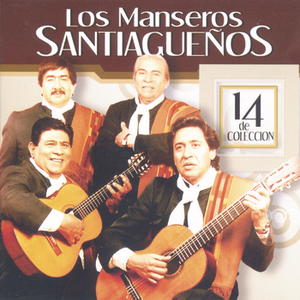Chacarera Del Rancho
Los Manseros Santiagueños Lyrics
Jump to: Overall Meaning ↴ Line by Line Meaning ↴
¿Cuál ha de ser?, ¿cuál ha de ser?
(La chacarera del rancho, señor)
Claro que sí, claro sí, pues)
Dentro de mi rancho, colga′o a un horcón
Tengo un violín, tengo un violín
(Es de algarrobo negro, también de mistol
Algo medio chico es mi rancho, tal vez
Para los dos, para los dos
Ya me estoy haciendo, cerquita al sala'o
Uno mejor, uno mejor
Cuando chacareras me pongo a cantar
¿Cuál ha de ser?, ¿cuál ha de ser?
(La chacarera del rancho, señor)
Claro que sí, claro sí, pues)
Yo le echo al rancho un alero especial
Para bailar, para cantar
(Para darme el gusto y allí vidalear
De Navidad a carnaval)
Un hornito y barro, mortero y fogón
Tengo además, tengo además
(A mi negra chula que sabe matear
¿Para qué más?, ¿para qué más?)
Si alguna huahuita pudiera tener
Uy, qué feliz, uy, qué feliz
(Pero como dicen que "Dios proveerá"
Ya ha de venir, ya ha de venir)
Cuando chacareras me pongo a cantar
¿Cuál ha de ser?, ¿cuál ha de ser?
(La chacarera del rancho, señor)
Claro que sí, claro sí, pues)
The song "Chacarera del Rancho" by Los Manseros Santiagueños is a cheerful tribute to the simple joys of life in the countryside. The singer starts by asking himself which chacarera (a type of Argentine folk music and dance) he should sing, before answering his own question with the obvious choice of the "chacarera del rancho". He then describes his humble home, hung with a violin made by himself from black carob and mistol wood, and acknowledges that it may be small, but he's always working to make it better. The song celebrates the simple pleasures of life in the country - the joy of dancing, singing and playing music with friends and family, of baking bread and making mate (a traditional South American tea) over a fire, and of looking forward to the future with hope.
The lyrics of "Chacarera del Rancho" are a celebration of the joys of rural Argentine life, and are steeped in the history and traditions of the nation's folk music. The song is written in the chacarera rhythm, which is a fast-paced 6/8 time signature that originated in the Santiago del Estero province of Argentina. The song's lyrics are full of references to traditional Argentine instruments and materials, such as the algarrobo negro and mistol woods used to make the singer's violin, and the hornito and barro (clay oven) where he bakes his bread. The song also references the importance of mate (a traditional South American tea), which is a staple drink in Argentina, Uruguay, Paraguay and parts of Brazil.
Line by Line Meaning
Cuando chacareras me pongo a cantar
When I start to sing chacareras
¿Cuál ha de ser?, ¿cuál ha de ser?
Which one should it be?
(La chacarera del rancho, señor)
(The chacarera del rancho, sir)
Claro que sí, claro sí, pues)
Of course, why not?
Dentro de mi rancho, colga′o a un horcón
Inside my ranch, hanging on a pole
Tengo un violín, tengo un violín
I have a violin, I have a violin
(Es de algarrobo negro, también de mistol
(It's made of black algarrobo and mistol wood
Hecho por mí, hecho por mí)
Made by me, made by me)
Algo medio chico es mi rancho, tal vez
My ranch is a bit small, maybe
Para los dos, para los dos
For us two, for us two
Ya me estoy haciendo, cerquita al sala'o
I'm already improving it, close to the living room
Uno mejor, uno mejor
A better one, a better one
Yo le echo al rancho un alero especial
I added a special roof over the ranch
Para bailar, para cantar
To dance, to sing
(Para darme el gusto y allí vidalear
(To enjoy myself and celebrate life there
De Navidad a carnaval)
From Christmas to Carnival)
Un hornito y barro, mortero y fogón
A little oven, clay, a mortar and a fireplace
Tengo además, tengo además
I also have, I also have
(A mi negra chula que sabe matear
(My dear partner who knows how to make mate
¿Para qué más?, ¿para qué más?)
What else do I need, what else do I need?)
Si alguna huahuita pudiera tener
If I could have a child
Uy, qué feliz, uy, qué feliz
Oh, how happy I would be
(Pero como dicen que "Dios proveerá"
(But as they say, "God will provide"
Ya ha de venir, ya ha de venir)
They will come, they will come)
Writer(s): Pablo Raul Trullenque, Fortunato Juarez
Contributed by Allison K. Suggest a correction in the comments below.
